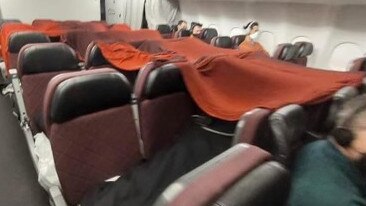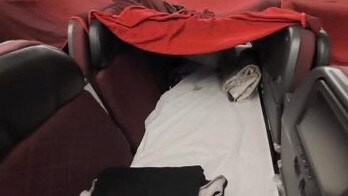Life of a flight attendants no easier in post-pandemic world
From cleaning toilets to bunking down in an economy seat, flight attendants have seen their important role in airlines degraded during the pandemic.

From cleaning the toilets to grabbing precious sleep across seats in the economy cabin, the job of an Australian flight attendant is about as far from glamorous as it’s ever been.
Once considered a desirable profession, airline cost-cutting and the changing aviation landscape has taken much of the shine off the job with marathon days, low pay and occasionally abusive passengers now the reality.
As a result of overhauled enterprise agreements, the base salary for cabin crew across Australia’s major airlines was now under $50,000 a year, starting from $45,864 with Virgin.
For that, flight attendants were expected to work up to 14-hours in a shift or 20-hours in unforeseen circumstances, dealing with the demands of hundreds of passengers while ensuring strict safety standards were adhered to.
Those working at Virgin Australia were also required to clean the aircraft between flights, and some of Qantas’s long haul cabin crew have found themselves sleeping across seats in economy on services to Los Angeles.

The situation angered Flight Attendants Association of Australia national secretary Teri O’Toole who said such low pay rates were making it impossible for members to get bank loans.
She feared “second-rate contracts” being offered to cabin crew would ultimately see many walk away from the industry.
“All that means is the standard of the people you’re going to get will be lowered, and that’s not something we want for the role of safety professionals,” said Ms O’Toole.
“The thing is it shouldn’t be the case because airlines got the staff retention payments from government, they got significant support yet they’re doing their worst for first response employees.”
The FAAA was currently seeking a better deal for Virgin Australia flight attendants who were regularly rostered on 11-hour shifts but not getting any breaks.
Ms O’Toole said under their award, they were entitled to a 20-minute break every 5-hours but often they were too busy cleaning aircraft between flights to sit down and eat.
“(Virgin) is running their operation so lean and tight and crew are dropping like flies,” she said.
“We’ve got people going fatigued and it’s not just that they’re tired, they haven’t had anything to eat. They want crew robots rather than people.”
A Virgin Australia spokeswoman said they were aware that duty lengths and breaks were two key issues for crew.
“We’re well advanced in designing solutions to these issues. We look forward to sharing these with our frontline teams in the coming weeks,” she said.
Overall the new EBA for cabin crew was working well, with airline operations running smoothly during the recent Easter holiday period, the spokeswoman said.
Hundreds of flight attendants from Virgin had jumped ship to Qantas in the pandemic, in order to continue working on international flights.
However Ms O’Toole said Qantas had been using crews from New Zealand on some services and not providing important crew rest areas on A330s operating between Brisbane and Los Angeles.

“The EBA for mainline crew says in any 14-hour plus duty horizontal rest is needed. Throwing a mattress across four seats in the economy cabin with a blanket overhead just doesn’t cut it,” said Ms O’Toole.
A more suitable in-flight rest facility was in the process of being incorporated into Qantas’s A330s which were now being used on longer routes than pre-pandemic.

Qantas executive manager of cabin crew Rachel Yangoyan said becoming a cabin crew member was still an attractive career for many, with the airline receiving more than 6000 applications for roles in the past few months.
“There are few jobs that can take you all over Australia and the world, and the possibilities for our crew are growing all the time, with new destinations like Rome and Seoul being added to our network,” said Ms Yangoyan.
“Becoming a Qantas cabin crew member gives you amazing customer service, safety and leadership skills. We saw through the pandemic how highly valued these skills were across many industries with many cabin crew being snapped up.”




To join the conversation, please log in. Don't have an account? Register
Join the conversation, you are commenting as Logout